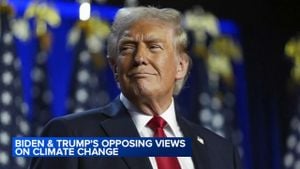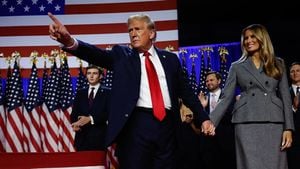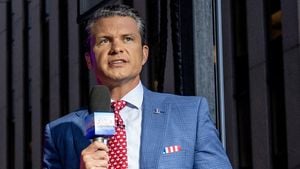The US will continue its fight against climate change and take action to curb greenhouse gas emissions, even amid the looming shadow of Donald Trump's presidency. John Podesta, the US special climate envoy, delivered this encouraging message at the opening day of the COP29 climate conference held in Baku, Azerbaijan. Despite concerns surrounding Trump's recent election, which many experts deem alarming for climate progress, Podesta emphasized enduring commitment to environmental safeguards.
Addressing the assembled delegates, Podesta labeled Trump as a climate denier who has openly threatened to dismantle environmental policies enacted by the previous administration. He stated bluntly, "Although under Donald Trump’s leadership, the US federal government placed climate-related actions on the back burner, efforts to prevent climate change remain a commitment. This will confidently continue." Trump’s election poses challenges such as possible withdrawal from international agreements like the Paris Climate Agreement.
Podesta's statements came as leaders from nearly 100 countries prepared to discuss pressing climate issues during the conference. The COP29 gathering has set the stage for significant negotiations, particularly focused on financial assistance for developing nations impacted by climate change.
Podesta remains optimistic, believing progress can be sustained at both local and national levels, acknowledging, “The fight is bigger than one election, one political circle, and one country.”
The backdrop to this climate summit is particularly urgent, with the UN's World Meteorological Organization (WMO) reporting alarming trends. According to their recent State of the Climate report, 2024 is on track to become the hottest year recorded. Rising ocean temperatures and accelerated glacial melt serve as mere reminders of the risks posed by climate change.
At COP29, delegates worked toward resolving long-standing challenges within international climate negotiations, including the establishment of mechanisms allowing wealthier nations to offset their emissions by investing in cleaner energy projects or reforestation efforts within developing countries. This proposal, depending on final negotiations, could allow rich countries to reduce their emissions commitments by funding environmental projects elsewhere, indicating how they may seek to meet their climate obligations.
Staggering amounts of time spent negotiating carbon markets, valued as potentially worth up to $250 billion per year, reflect the complexity of climate agreements. Environmental advocates remain wary about fraud related to carbon market schemes, pointing out disparities between promised climate actions and real-world impact.
Meanwhile, outside the conference walls, the reality of financial hurdles looms large as wealthier nations ponder how to increase their climate finance contributions to economically disadvantaged countries. Economic conditions are tight, and climate finance was already at the forefront of global discussions. UN climate change chief Simon Stiell flagged the urgent need for wealthier nations to step up funding since two-thirds of the world lacks the means to transition swiftly to lower emissions.
One NGO representative, Teresa Anderson, echoed the sentiment during press briefings, emphasizing, “This is a test for rich countries. If they believe in the climate emergency, they should be willing to pay more than their fair share, not less.” A staggering $1 trillion is required to support poorer countries as they attempt to manage the dual challenges of emissions reductions and the adaptation necessary to buffer against climate disasters.
Back at the negotiation desks, Podesta's leadership lies not only within affirming US commitment but also being steadfast against Trump’s anticipated environmental rollbacks. Experts predict the consequences could be dire, with estimates stating his second term might increase carbon emissions considerably, impacting global climate efforts.
Podesta's resolute stance at COP29 signals not just determination but also highlights the increasing role cities and individual states are poised to have. Recognizing the potential influence of local governance on the climate crisis, he appealed to subnational leaders to continue pursuing sustainable initiatives, independently of federal direction.
Looking eastward, many observers maintain skepticism about China's commitment under the upcoming Trump administration’s potential reluctance to enforce climate policies, impacting how nations may strategize and execute plans for emissions reductions. Former US special envoy Todd Stern remarked, "The two biggest players are the US and China, with China knowing it has less pressure from Washington now" responding to Trump's presidency.
While the proceedings at COP29 continue, the ramifications of the election resonate throughout discussions about climate action moving forward. John Podesta and fellow delegates are addressing the lessons learned from preceding climate discussions, all under the weight of the adversities looming from Trump’s leadership.
Final decisions on various financial pledges and commitments are expected soon, as negotiations intensify to achieve tangible outcomes before the culmination of the COP29 conference. Assembly members hope to find shared ground, enabling collaborative international action to avert the impending climate crisis.
Despite the uncertain climate future ushered by Trump's return to power, the resolve to combat climate change remains palpable. "The struggle with climate change is not confined merely to politics—it’s about our future," Podesta remarked, illustrating the battle against climate change is far from over.
Activists, lawmakers, and advocates from numerous nations look on with hopes held high for COP29 yielding beneficial agreements, even as the clock ticks on efforts to safeguard the planet.
What happens next might reshape not only the future of climate policy but also could define international relations as powerful nations navigate their obligations qualitatively. While the backdrop of Trump's presidency undoubtedly casts shadows of concern, Podesta's firm stance echoes the sentiment among many attendees at COP29: resilience exists amid challenges, providing momentum for promoting effective climate solutions.



